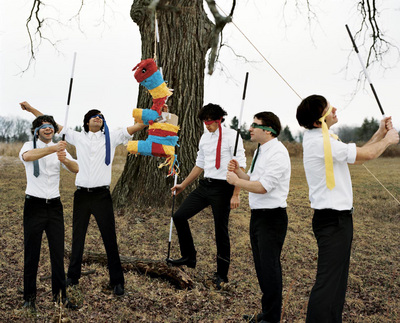Tally Hall back where it all began, with a new album and a Blind Pig date

Tally Hall is finally releasing its long-awaited new album.
Photo courtesy Atlantic Records
“We are no longer an Atlantic Records band,” confirmed drummer Ross Federman in a recent phone interview prior to the release of the group’s new—and long-awaited—album June 21. They are booked to play a record release gig at the Blind Pig July 22.
“The time we spent with (Atlantic)—I like to think we both benefitted from it. I know we definitely benefited in certain regards … but it seemed like the time to end that partnership had come. We were free agents for a while and now we’re back on Quack!, which was the label we signed with and recorded with before we moved to Atlantic.”
Zubin Sedghi, Tally Hall’s bassist and vocalist, said he is just excited to have new music to offer the group’s fans.
“We’re finally moving everything forward, which is good news,” he said. “We’ve been trying to get this album out for a long while, and we’re just all happy it’s finally coming out.”
Tally Hall, formed in 2002 while its members were attending the University of Michigan, released their debut album, “Marvin’s Marvelous Mechanical Museum,” locally in 2006 on Quack! Atlantic Records picked then up in 2008, and the label re-released “Marvin” nationally, however the album didn’t chart.
PREVIEW
Tally Hall
- Who: Alt-pop band formed in Ann Arbor: Ross Federman, Zubin Sedghi, Joe Hawley, Rob Cantor and Andrew Horowitz.
- What: Local-gone-national wonk-rock band has a new CD, “Good & Evil,” coming out Tuesday on the local label Quack! Media. Info: www.tallyhall.com
- Where: They will perform a CD release party for the new disc at the Blind Pig (with Speak, and Casey Shea).
- When: 8 p.m. (doors) Friday, July 22.
- How much: Bliind Pig date, $15.
New York-based singer-songwriter Casey Shea has appeared with the band at some dates (and will open the Blind Pig show in July).
Neither Sedghi nor Federman is disappointed with how things turned out with Atlantic.
“We are grateful for everything they’ve done for us—they’ve really helped us with this second record,” Federman said. “In the process of recording it we were still with the label. For whatever reason, once we were done with recording the record, it just didn’t make sense for either party any more. It was a pretty amicable split and decision that was reached mutually.
“It’s tough to tell where major labels are at these days but I guess sometimes it just makes sense to end even after investing a lot of time and money in projects,” he added. “We were happy with that, we were happy to take the record that they so graciously funded and be able to do what we want with it.”
For the new album, which is titled “Good & Evil,” the band worked with producer Tony Hoffer (Depeche Mode, Beck and Belle and Sebastian).
“In the early stages of figuring out who to work with, (Hoffer) was high up on the list,” said Federman. “For me, listening to his stuff with Beck, you could tell how visceral it was, and punchy and how much you could feel the music and the beat. That was something that had been lacking from our earlier recordings, perhaps, and that we wanted to bring out more as much as possible. … His work with Belle and Sebastian along those lines is just full of the life and emotion that we have always sought after in our music and that we could tell he was able to bring out in recordings.”
Although it might be tempting to see the album’s title as a reference to their major label experience, both bandmates said that’s not the case.
“The theme of dichotomies runs through the album and each song reflects that to a varying degree,” said Sedghi. “You could sum up all kinds of relationships with that title,” Federman added.
Both say the new CD reflects the maturity that comes with being exposed to new situations and experiences.
“It’s definitely different,” Federman said, “but in a way that I think naturally came to us. The thing to remember about the first record is the bulk of the songs were written in early college years—some of the lyrics were written when the writers were still in high school. We’ve come along way as people in general, as anybody changes from their early college years to post-college life.
“But it’s important to stress,” he added, “that it wasn’t so much a deliberate change. We didn’t sit down together and say ‘Hey we need to change our sound, we need to do this or that.’ “We started writing after we’d been touring for a long time and working on stuff and living in New York versus Ann Arbor … Things change, your whole life changes, your influences kind of get augmented, the life around you feeds into that.”
Both musicians are keenly aware it’s been quite a wait between albums, and want to thank their fans—especially those in Ann Arbor—for their patience.
“Thanks for sticking around and being awesome,” Sedghi said in a message directed at the fans.
“Everything over the last five-six years has only been possible because of the fans and their support,” Federman added. “Without the fans in Ann Arbor from the start we would never have been able to try and expand on (our beginnings). I feel a lot of gratitude.”

